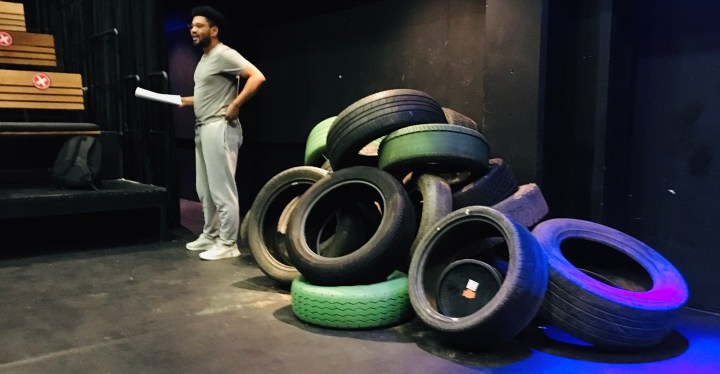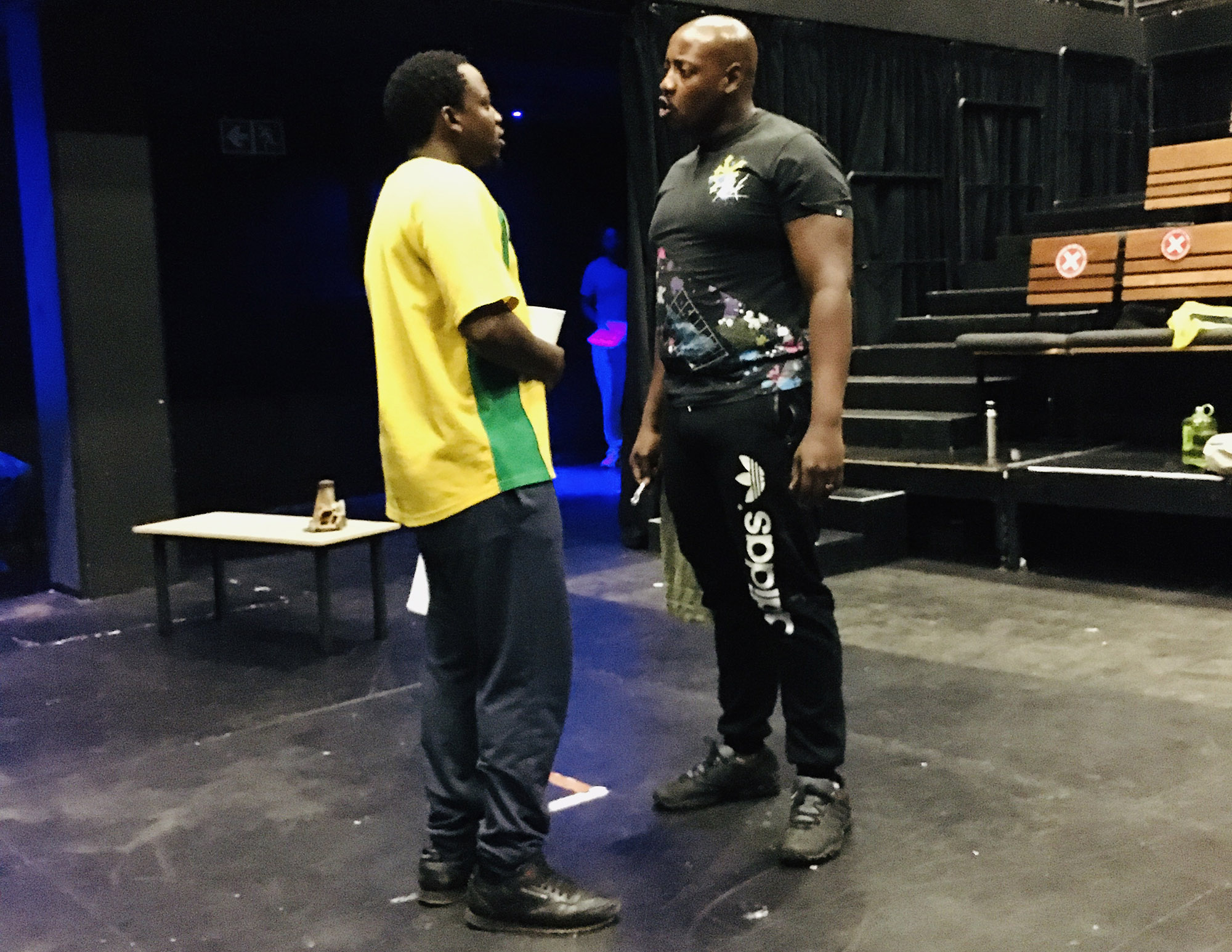THEATRE REVIEW
The Brothers Size: The cast is a marvel in this provocative and engaging work

After two years of dark theatres (and the shuttering of some of them permanently because of Covid-19), the Market Theatre is roaring back with a sizzling production of ‘The Brothers Size’ by Tarell Alvin McCraney, marking Black History Month. This comes after a superb production of Athol Fugard’s early classic ‘The Blood Knot’.
Some 12 years ago, the Syracuse Repertory Theatre from upstate New York visited South Africa and presented an extraordinary dramatic vision on the stage of the Barney Simon Theatre at the Market Theatre in Newtown, Johannesburg. Tarell Alvin McCraney’s The Brothers Size is part of a trilogy about the fraught dynamics of families, and McCraney is now internationally recognised for his Oscar-winning reworking of the script for his play Moonlight. On its own, though, The Brothers Size stands convincingly as a major drama.
When the play was first performed in Johannesburg by its American cast, symbolism drawn from Yoruba mythology seemed to permeate the action. There was the god Ogun, the master of iron and fire; the spirit, Oshoosi, the spirit of the forest and a perpetual wanderer; and Elegba, the tormentor, disrupter and tempter of others.
In McCraney’s play, Ogun is an auto mechanic (mastering automobile engines and panel-beating the chassis). His brother, Oshoosi, has recently been released from a Louisiana prison and is now living uneasily with Ogun. Meanwhile, Elegba, Oshoosi’s prison cellmate (and perhaps his prison lover as well, there are hints and whispers), now that he, too, has been released from incarceration, has been coming around the Sizes’ home and Ogun’s garage, offering the temptations Oshoosi is desperate to enjoy.
Elegba encourages Oshoosi to break free from this new “prison” of Ogun’s life and for them to drive together to town, watch all the women and enjoy the freedom of the open road in a car whose ownership has dubious provenance. Naturally, things go very badly, just as they must when the story is so deeply steeped in the textures of ancient legends, gods, spirits, and the inevitability of retribution.
It has become a minor miracle of drama, therefore, that under James Ngcobo’s taut direction, with this new production, the legendary layer of Yoruba myths in McCraney’s play recedes, even though it cannot be abandoned, of course. Instead, in this new production, the play is now more firmly rooted in the here-and-now of its Louisiana landscape. This is a world still distinctly unliberated from the unbalanced dynamic of US black and white race relations — and the ever-present reality of police harassment, or worse, always looming in the background.
In this production, Nadya Cohen’s stage design in the Mannie Manim Theatre at the Market is stark, harsh, even unforgiving. A jumbled, helter-skelter pile of truck tyres can serve as both a bed or a car chassis under repair, while a black plastic bucket may represent Oshoosi’s nightmares, even as it serves as a storehouse for his modest, humanising possessions like an aerosol bottle of cologne. Simon King’s lighting design and Andrea Rolfes’ very realistic audiovisuals all effectively reinforce the drama’s storyline and contribute to the looming menace in the play.
But it is the cast, under Ngcobo’s direction, that is a real marvel. Ogun Size is played by Nhlakanipho Manqele, Oshoosi Size is portrayed by Katlego Chale and Elegba is played by Marlo Minnaar. Ogun is depicted as strong and unyielding, a human rock, in spite of, or perhaps because of, the rough deal he has been dealt by life. It is only slowly that Ogun Size opens up near the climax of the work to reveal his own deep pain and suffering, his concealed hurts and his only partially revealed secrets — and in the last moments of the drama, his unlimited love for his tragically flawed brother, Oshoosi.

Oshoosi (left) and Ogun rehearse their confrontations at the Market Theatre. The critically acclaimed play, ‘The Brothers Size’, by award-winning playwright Tarell Alvin McCraney, makes its return to the Market Theatre in celebration of Black History Month. (Photo: Supplied)
Oshoosi, meanwhile, is an anguished tangle of wants and desires whose simple needs could be met by a drive through the night without cares or worries, in the aftermath of his years in prison, if he only had a car. And Elegba, when he arrives, is the disruptive element whose very presence unsettles Oshoosi, even as it tears up the precarious balance the two brothers have fitfully achieved.
Ultimately, Elegba introduces the fatal contamination into the lives of the Brothers Size as it generates the play’s tragic denouement. His actions and possessions become so much more than one of those artificial MacGuffins that often drive the action in a play or film. In this case, it becomes something only too believable, and with results that are sadly inevitable.
The three men in their roles have achieved one of the more difficult things for South African actors to do — to offer believable American regional accents. In this case, it is their consistent, convincing African-American, Louisiana bayou accents that never waver or become uncertain, and in which the lines are neither swallowed nor hurried. (In truth, if the accents had been entirely rooted in a full-on American accent appropriate to the locale of the action, many in local audiences might have been unable to pick up crucial parts of the dialogue. Thus, settling on a modified but consistent version of such an accent has been the wiser course of action.)
Unlike the Syracuse version, where the three actors almost danced their way through much of the story, and especially with a lithe Elegba nearly offering a pasodoble as the destructive spirit that upset the delicate balance between the brothers, in this new production, choreography by Lulu Mlangeni is more subdued. It blends subtly with the acting and Ngcobo’s blocking of the action. Or, as Ngcobo said to us while he was still working on the production, “That is what I wanted us to do, to have another incarnation of the play, 12 years later.” In that goal, he has notably succeeded.
The Brothers Size runs until the end of February and it should be on the schedule of everyone who is hungry for a chance to see a complex, engaging, thoughtful, yet provocative work of theatre. But leave the young ones at home — the language is totally unvarnished, even if it sounds just right in the context of this drama. DM
[hearken id=”daily-maverick/9153″]

















 Become an Insider
Become an Insider
Comments - Please login in order to comment.